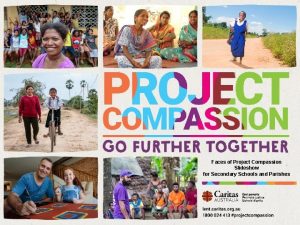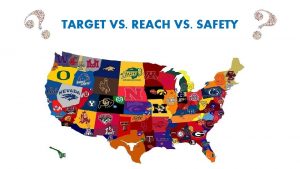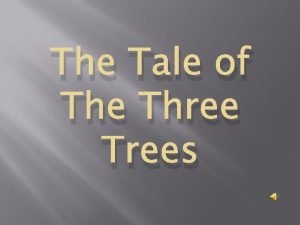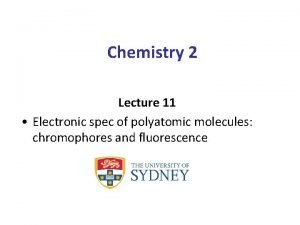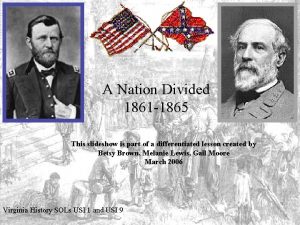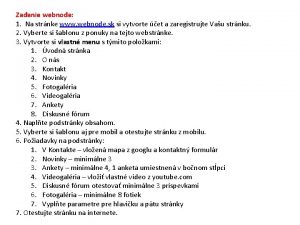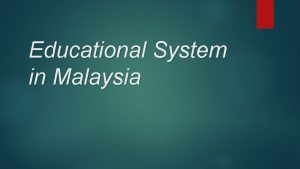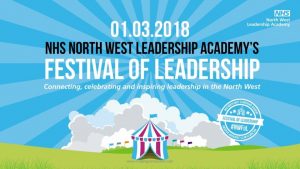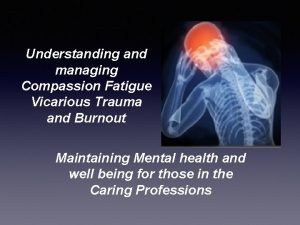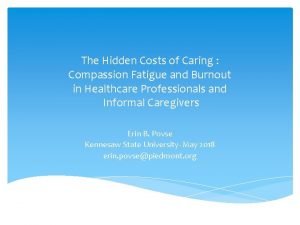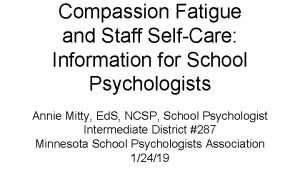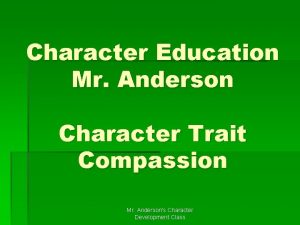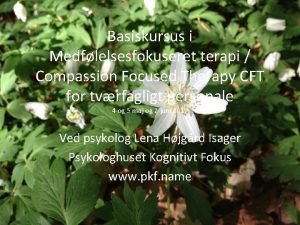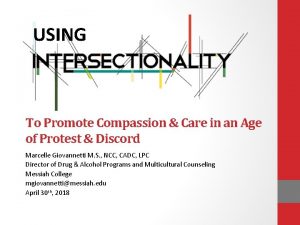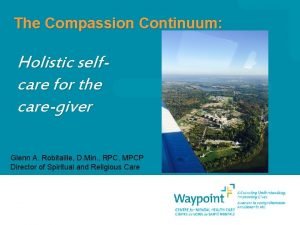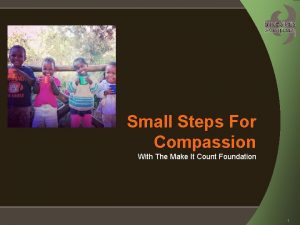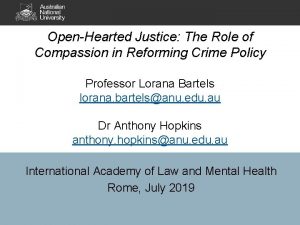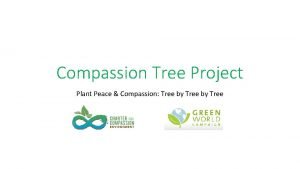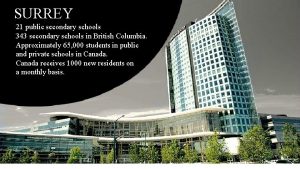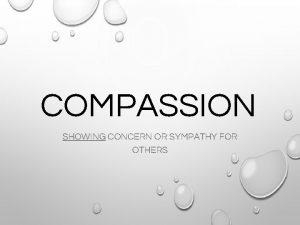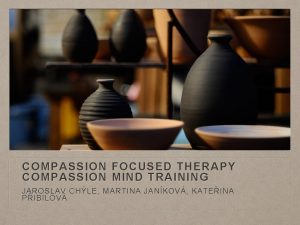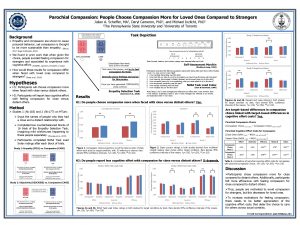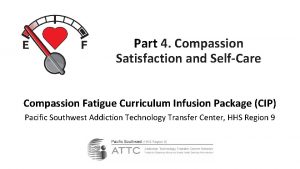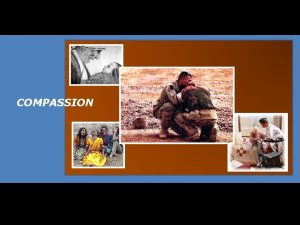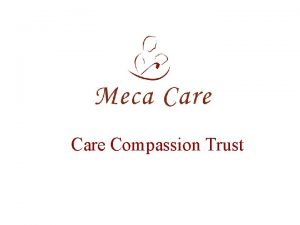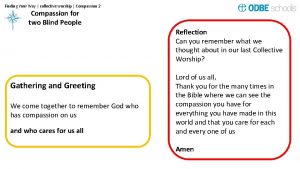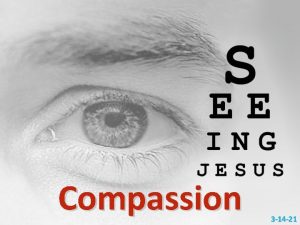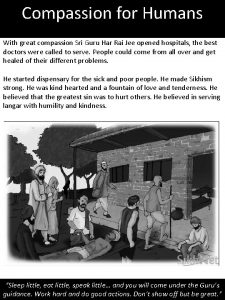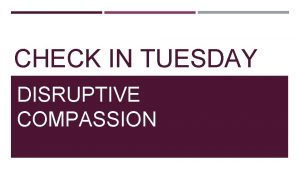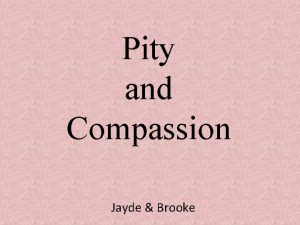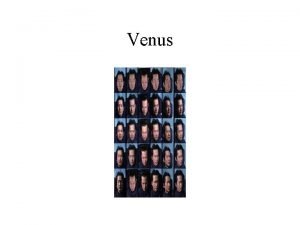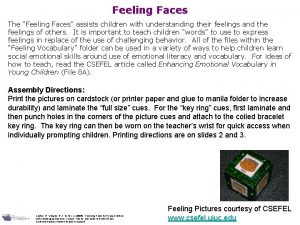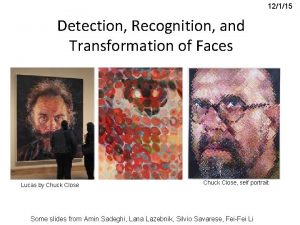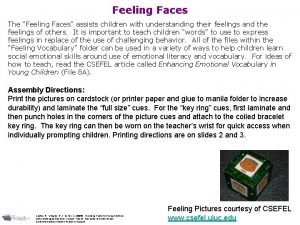Faces of Project Compassion Slideshow for Secondary Schools



































- Slides: 35

Faces of Project Compassion Slideshow for Secondary Schools and Parishes

We believe we are one human family and have a responsibility to help each person achieve their full potential. This is the common good. In this time of increasing global change, conflict and inequality, the principle of the ‘common good’ is now more important than ever. This is one of the reasons Project compassion 2020 takes theme of Global Community – Go Further Together. Photo credits throughout: Richard Wainwright – Shirley (Philippines), Phany (Cambodia) and Barry (Austsralia), Patrick Hansda – Sakun (India), Pilirani Chimombo – Tawonga (Malawi), Autu – Dominic (Papua New Guinea). .



Shirley is a 36 year old indigenous Manide women and mother of four who has turned her life around. Shirley was struggling to support her sick husband four children. As an indigenous woman she faced regular discrimination and disadvantage which limited her family’s access to healthcare, employment, education and food.

Unequal access to health services means that many indigenous children and families cannot access basic medical care. With Caritas Australia’s support, Shirley trained to become an indigenous health worker. She is now leading her community to take a stand against discrimination, to improve health and education, and to pave the way for a better future. Shirley administers multivitamin drops to a child at the local government health clinic.

“I became the voice of my tribe to have their needs heard, ” Shirley says. “As a trained health worker, I am confident to talk, to mingle with nonindigenous people, even with government employees. ” Shirley has also learnt to supplement her income by growing vegetables. She is now able to feed her family and send her children to school. Shirley (right) talks with a mother and child sitting outside their traditional hut whilst conducting home health visits.

I am proud of what I have done for my tribe. My dream is to be able to provide for my kids and have them finish their studies. Shirley, Angel and Angelo outside their home before leaving for the local school.


Phany (par-nee) and her family now have a bright future to look forward to since joining a Caritas supported program in Cambodia. Phany, lives in a village in western Cambodia. Struggling to earn a living as a farmer, she was forced to leave her daughter behind in the village, to take up construction work in the city.

In 2016, Phany joined the Upholding Community Dignity Together program, where she learnt new farming techniques, such as using a drip irrigation system. This enabled her to get a better harvest from her vegetable crops and to conserve water in her drought-stricken region. Phany (left) in her garden of morning glory vegetables talks with Sokly, project coordinator for Caritas Australia’s partner.

Phany and her husband are now able to afford a small house, they have enough food and clothes and can send their daughter to school. Phany has become a role model for other farmers, and her whole community is benefitting. Phany has lunch with her husband Seiha and daughter Phally at their home.

Phany pictured in one of her gardens growing a vegetable called morning glory.


Barry has overcome many of life’s challenges to become an inspirational father to his four girls and a leader in his community. Barry embodies resilience and strength. Growing up in a tough environment, he had to look inside himself to make the right choices for himself and his family.

Barry, a Gamilaroi man originally from western New South Wales, remembers his early years as a time of enormous hardship. He didn’t have a stable home or support network and was mostly brought up by his grandparents. Barry became a father in his late teens and started drinking heavily when faced with responsibilities he wasn’t ready for. Barry walks through a forest near his home. The symbol of trees form a large part of Red Dust Healing tools.

Barry turned his life around by participating in Red Dust Healing – a cultural healing program, designed and run by First Australians. The program encourages participants to examine their own personal hurt and allows them to heal from within. It addresses family and personal relationships, and what may have been lifelong patterns of violence, abuse and neglect. Red Dust Healing program leader Tom, holds a Red Dust Healing tools card near his home town of Narromine, Australia

Today, Barry is an inspirational father to his four girls and a respected leader in his community. He now facilitates Red Dust Healing workshops and helps others through their healing process. Barry looks in rock pool with his daughter on a beach near his home in Bateman's Bay.

Barry plays with his daughter (7) on a beach near his home.


Sakun received support to set up a thriving kiosk and is now involved in village decision-making. Sakun lives in a village in central east India. She developed polio as a child and has difficulty walking. Until now Sakun, an indigenous Gond woman, has been isolated in her community and unable to earn a living.

Caritas Australia’s partners, Caritas India and Samarthan, helped Sakun to access a custom-made tricycle. This has helped her get around, so she is less isolated. Sakun also undertook training in microbusiness development. With a small grant, she set up a kiosk, selling food near the local school. Sakun using her tricycle to move around her community.

Sakun now earns her own income and makes a small profit which goes towards her family’s basic needs. She is more resilient, more confident and more independent. Sakun preparing food for her family.

Sakun’s business is thriving, her kiosk is always busy, as she sells to around 900 students.


Tawonga’s life has transformed. She now has three meals a day and is thriving at school. Tawonga is 10 -year-old. She lives with her family in a village in northern Malawi. For most of her life, her parents have struggled to provide food for the family. They also faced discrimination due to her disability. She was born with one leg weaker than the other and relies on crutches.

In 2016, during a food crisis in East Africa, Tawonga’s parents joined the A+ program run by Caritas Australia’s partner, CADECOM (Catholic Development Commission in Malawi). They learnt irrigation farming and were given fertiliser and high-yield seeds, which were put in a seed bank. Boreholes were dug to enable access to safe water that led to a reduction in waterborne diseases. Irrigation system in Tawonga’s community.

With these new farming techniques and infrastructure, their harvest has almost tripled. Tawonga’s mother also joined the village savings and loans group and was able to start a small business, selling fish, rice and vegetables. Tawonga’s parents now grow enough food to provide three meals a day, ending the struggle of malnutrition, as well as helping Tawonga to thrive at school. Tawonga’s family and community members.



Dominic, 47, is a father of six from Papua New Guinea. He became involved in a Caritas Australia supported program and turned a difficult life and an unhappy relationship around. Domestic violence, drug and alcohol abuse and limited employment opportunities mean that many in PNG struggle to meet their basic family needs.

In 2016, Dominic joined the Safe House program run by Centre of Hope, one of Caritas Australia’s partners in PNG. The program provides Gender. Based-Violence prevention training, counselling services and safe accommodation for women and children survivors of violence. Dominic and his wife, Christophylda, say that their family life is now harmonious, happy and safe. Dominic and his family.

Gender inequality is also a major issue in PNG, with around 67% of women experiencing gender-based violence. Dominic undertook further training as a Safe House community volunteer because he wanted to help other people like him. He soon became a valuable member of the support network. Dominic leading a training session.


 Project compassion 2016
Project compassion 2016 A 3d shape with 6 faces 8 vertices and 12 edges
A 3d shape with 6 faces 8 vertices and 12 edges Powerschool hsv
Powerschool hsv Safety reach target
Safety reach target Tommy's window slideshow prayer
Tommy's window slideshow prayer The tale of three trees slideshow
The tale of three trees slideshow Sabbath school lesson powerpoint
Sabbath school lesson powerpoint Naruto slide show
Naruto slide show Dust bowl slideshow
Dust bowl slideshow Dividing negative numbers
Dividing negative numbers Lord of the flies chaoter 8 summary
Lord of the flies chaoter 8 summary Summary of farenheight 451
Summary of farenheight 451 Franck-condon principle lecture notes
Franck-condon principle lecture notes Slideshow
Slideshow Webnode slideshow
Webnode slideshow Probability slide
Probability slide Open house slideshow
Open house slideshow What term describes a slideshow that plays continuously
What term describes a slideshow that plays continuously Electricity powerpoint
Electricity powerpoint Jacob and esau slideshow
Jacob and esau slideshow 19032007 color
19032007 color Martin luther king slides
Martin luther king slides Level of education in malaysia
Level of education in malaysia Objectives of teaching economics in icse board
Objectives of teaching economics in icse board Benefits of self compassion
Benefits of self compassion Compassion fatigue signs
Compassion fatigue signs Compassion fatigue vs burnout
Compassion fatigue vs burnout Forever author of salvation
Forever author of salvation Ted talk compassion fatigue
Ted talk compassion fatigue Compassion character trait
Compassion character trait Compassion fokuseret terapi øvelser
Compassion fokuseret terapi øvelser What is american dream in the great gatsby
What is american dream in the great gatsby Compassion care counseling
Compassion care counseling Compassion continuum
Compassion continuum Small steps for compassion
Small steps for compassion Definiton of compassion
Definiton of compassion
